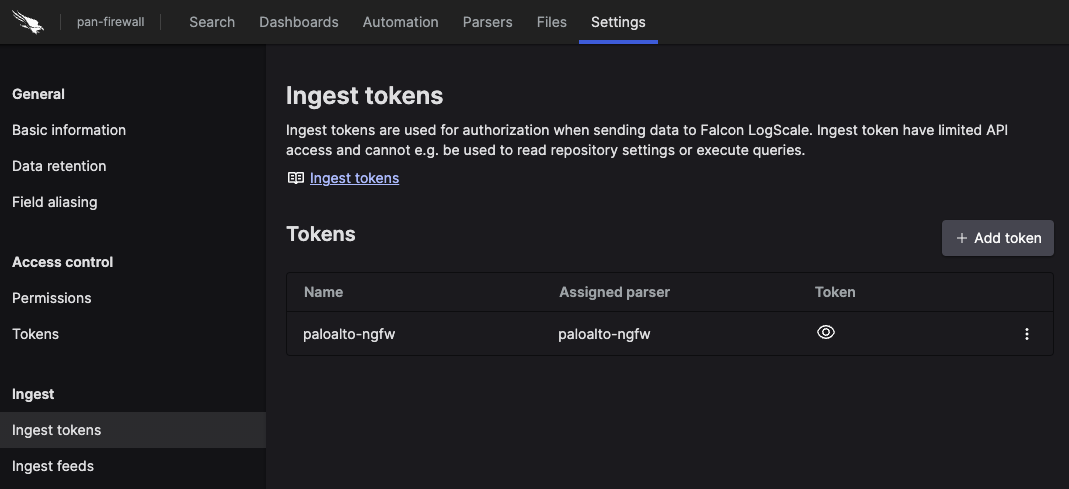
paloalto/firewall
| Vendor | Palo Alto Networks, Inc. | Parsers | ✓ |
| Author | CrowdStrike | Dashboards | ✗ |
| Version | 1.2.1 | Alerts | ✗ |
| Minimum LogScale Version | 1.142.0 | Actions | ✗ |
| Use Cases | ITOps SecOps | Scheduled Searches | ✗ |
Palo Alto Firewall package can be used to parse incoming log events making it searchable in Falcon LogScale.
This package supports the following log types:
The parser normalizes data to a common schema based on CrowdStrike Parsing Standard (CPS) 1.0. This schema allows you to search the data without knowing the data specifically, and just knowing the common schema instead. It also allows you to combine the data more easily with other data sources which conform to the same schema.
Installing the Package in LogScale
Find the repository where you want to send the events, or Creating a Repository or View.
Navigate to your repository in the LogScale interface, click Settings and then on the left.
Click and install the LogScale package for (i.e. paloalto/firewall).
When the package has finished installing, click on the left still under the .
In the right panel, click to create a new token. Give the token an appropriate name (the name of the event hub it will collect logs from), and leave the parser unassigned, you can assign the parser paloalto-ngfw to the Log Collector Configuration as described in the documentation Configuration Examples.

Before leaving this page, view the ingest token and copy it to your clipboard — to save it temporarily elsewhere.
Now that you have a repository set up in LogScale along with an ingest token you're ready to send logs to LogScale.
Configurations and Sending the Logs to LogScale
Follow the Palo Alto Documentation to configure syslogs to send to Falcon LogScale. You can find more information on the logs here: Syslog Field Descriptions.
Next, configure the Falcon LogScale Collector to ship the logs from your syslog server into LogScale. Follow Log Collector Install Falcon LogScale Collector and Configure Falcon LogScale Collector. Log Collector documentation also provides an example of how you can configure your syslog datasource, see Configuration Examples.
Verify Data is Arriving in LogScale
Once you have completed the above steps the data should be arriving in your LogScale repository.
Package Contents Explained
This package parses incoming data, and normalizing the data as part of that parsing. The parser normalizes the data to CrowdStrike Parsing Standard (CPS) 1.0 schema based on OpenTelemetry standards, while still preserving the original data.
If you want to search using the original field names and values, you can access those in the fields whose names are prefixed with the word Vendor. Fields which are not prefixed with Vendor are standard fields which are either based on the schema (for example, source.ip) or on LogScale conventions (@rawstring).
The fields which the parser currently maps the data to, are chosen based on what seems the most relevant, and will potentially be expanded in the future. But the parser won't necessarily normalize every field that has potential to be normalized.